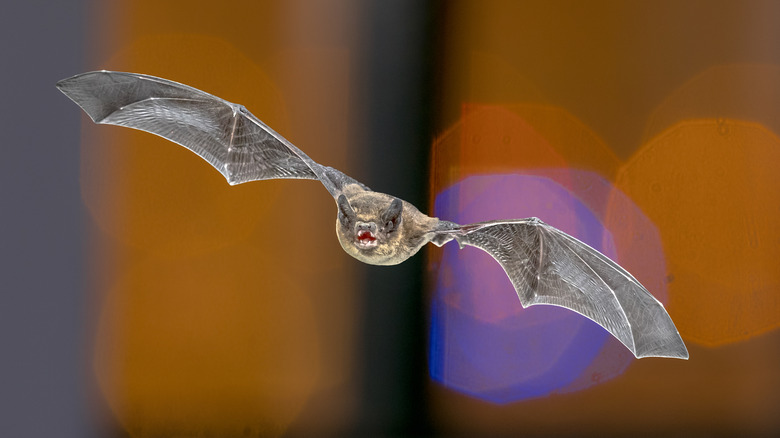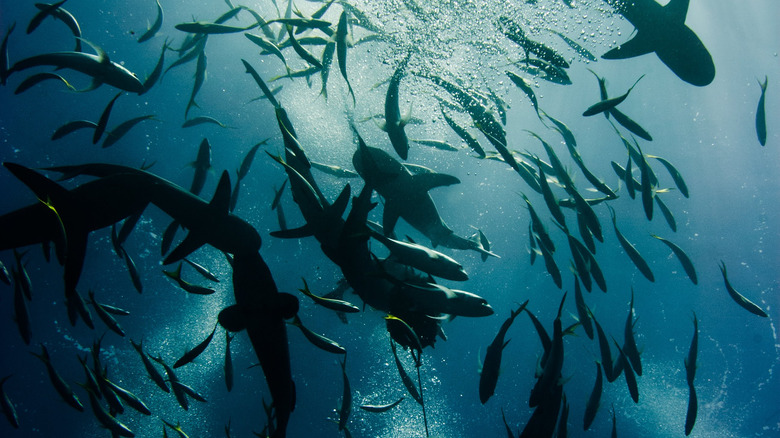The 4 Extra Senses Animals Have That Humans Are Missing
We humans like to think of ourselves as the top of the food chain, the crème de la crème of Earth dwelling species. While we might have a leg up on the animal kingdom with our wit and technology, it could easily be argued that other animals are simply more genetically advanced. Take, for example, just eyes, and you will find a whole host of animals with clearer or sharper vision, such as eagles (via Earth Sky). If you go beyond what the eye can see, you'll quickly learn that there are many animals who possess senses we don't even have that enhance the ways in which they view and experience the world.
From infrared vision to echo-enhanced navigational skills and the ability to sense electrical fields to a strange relationship with magnetic Earth, here is a look into the extra senses animals have that humans do not.
Echolocation is one sense that permits animals to see where they're going in a way that humans cannot
It's pretty mind-blowing to consider that there are animals who going around "seeing" and navigating the world through a series a sharp, inaudible sounds. Yet this is exactly what happens for animals possessing the sense of echolocation. Thought Co. explained that certain animals are born equipped to hear and emit high-frequency sounds that are completely inaudible to human beings. They rely on echoes from these sounds to navigate the world.
From the nocturnal oilbird to the killer whale and a myriad animals by land and sea between them, echolocation makes light work of navigating darkness. Animals that have the extra sense of echolocation need not see with their eyes to find their way through pitch-black caves and deep, dark ocean dives. Instead, they listen for the high-pitched hum of echoes bouncing off static objects. This sense is commonly found in bats, dolphins, and some whales. One of the most fascinating aspects of echolocation is that it functions differently in different animals, appearing to some as a series of ultrasonic whistles and to others as a collective of ear-shattering screams (via Discover Wildlife).
Some animals have a magnetic sense that puts them more in tune with Earth
When you think of circling sharks, you might automatically associate the action with a feeding frenzy. While at times that may be true, new research published by the journal Current Biology and reported via WABI 5 News confirmed that sometimes sharks circle because they are tapping into Earth's magnetic field, which they use as a kind of oceanic GPS.
You might not realize it, but our planet generates an unfathomably large magnetic shield that pierces through space for thousands of miles, protecting us from supercharged particles that are constantly being hurdled at us by our very own sun (via NASA). While we walk around oblivious to this, other more genetically sophisticated beings are totally tapped into Earth's magnets. Science Daily reports that the sense of magnetism is exhibited by sea turtles, lobsters, sharks, and migratory birds, just to name a few. Scientists are somewhat baffled by nature's unseen magnetic force. Newer studies suggest that certain creatures might exhibit a symbiotic relationship with magnetic bacteria, but the verdict on how this phenomenon occurs is still out.
Infrared and ultraviolet vision is one sense many other animals possess
As you slather lotion onto yourself from a beach chair, you might consider the harms of ultraviolet rays. Yet even when aware of these hazards, you simply cannot see them. This is because human vision is inferior to animal vision in certain ways. For example, many animals can vividly see a fourth dimension of color (via PBS). Others are equipped with "infrared eyes" (via Thought Co).
This subset of visual senses that human beings lack enables the vast majority of animals to see hazardous ultraviolet rays and/or infrared radiation. In terms of hunting and navigating, this is mostly a good thing. However, according to PBS, recent research has shown that due to having this sense, power lines appear perilous to a large portion of animals inhabiting our modern landscape. As such, this sense can be viewed as simultaneously positive and negative due, in large part, to human interference.
Some mystifying Earth creatures have an electric sense
Imagine being able to light up a lightbulb with the simple touch of your fingers. This powerful sense sounds like it belongs in a Marvel movie, but it's common to many animals. The electric eel and other maritime creatures can tap into electrical fields and have been able to use some of that electricity in literally shocking ways (via Mental Floss).
For example, the Guiana dolphin possesses modified hair follicles that allow it to sense electricity, making it a skilled hunter and navigation pro. The oriental hornet takes this sense a step further by converting sunlight into electricity for an inexplicable solar-powered surge (via National Geographic). Terrifyingly enough, the predatory shark is the animal whose electrical sense is strongest. According to scientists, sharks can tap into electricity at a rate 10,000 times greater than that of any other animal on the face of the planet.
Much of modern tech aspires to harness the power of these extra-human senses
Humans might not have all the senses of a wide-tooth shark, but we sure make up for it with our creativity. Science News for Students reports that submarine sonar is heavily inspired by echolocation. Sound waves are also the component responsible for pre-birth ultrasound imagery. While we might not have a direct relationship with magnetic bacteria or Earth's electrical force field (that we know of), this hasn't stopped us from harnessing such energy in our own way, as we have done with lightbulbs, compasses, refrigeration, and the list goes on. Recently, scientists even deciphered a way to create electricity from the ambient magnetic fields generated by household appliances (via Electrical Contractor). While we, ourselves, cannot see infrared or ultraviolet light, the smartphones we carry actually can (via Business Insider).
Could our innate human ability to mimic the sensory organs of others be considered an "extra sense" all its own?





